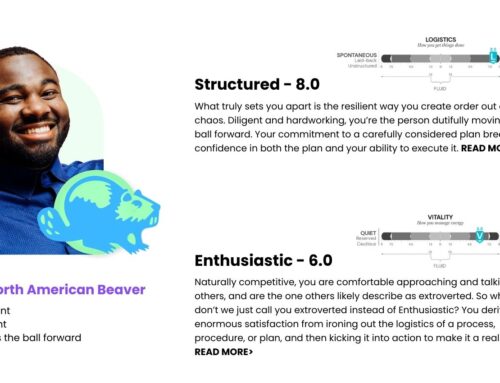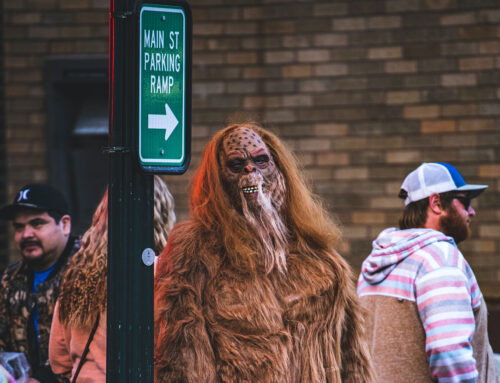Personality Lessons from the Pandemic
At the start of the pandemic, it was widely believed Quiet, introverted personalities would do better than their more outgoing, extroverted counterparts. After all, introverted people were already accustomed to spending long stretches of time alone.
Not only did this prediction prove false, it was actually 180-degrees wrong. It turned out introverts actually suffered more from the lockdown – a lot more.
And in that revelation comes some important personality lessons from the pandemic. For starters, more introverted workers already drained from the pandemic may look at the attractive job market and consider finding work that doesn’t force them back into an office with gobs of in-person meetings and extroverted bosses.
It’s also a reminder that it’s a lot easier for companies to accommodate their team members when they have a solid understanding of their unique personalities – especially at a time when a stunning 95% of employees are considering a job change.
A Steady Mental Decline
If you were a personality scientist at the start of the COVID-19 pandemic, you recognized not only the risk of a global mental health meltdown (didn’t happen), but also the unique opportunity to study the psychological responses of people essentially locked away up in home laboratories.
At the start of the lockdown (March 2020), a study by psychologists at the University of Bern revealed that introverts and extroverts were more or less struggling with the same levels of loneliness, anxiety, and depression. Everyone, it seemed, was struggling.
However, a bit later that spring, a study by Maryann Wei at the University of Wollongong revealed that introverts were suffering from substantially higher levels of “severe loneliness, anxiety and depression.”
And by early summer, another study, this one conducted by Anahita Shokrkon at the University of Alberta, confirmed Wei’s findings: outgoing personalities clearly were coping much better than their quieter, introverted counterparts.
What was going on? Why were introverted personalities struggling during the pandemic and what lessons, if any, could be gleaned from the answers?
Adapting to a New World Order
Behavioral experts have long known that humans will shape their environments to meet the unique needs of their personalities – not only do we adapt, but those adaptive practices are driven by our personality preferences.
Which is why, once the initial shock of the lockdown began, extroverts went to work using videoconferencing technologies and other tactics to reengage with family and friends (think Zoom happy hours). This also may explain why those initial studies at the start of the lockdown showed little difference between introverts and extroverts, but as the pandemic wore on, the extroverts proved better able at adapting.
In Shokrkon’s estimation, extroverts fared better because they reworked their environments to provide that social stimulation they needed. “These strong friendships that they had before the pandemic were perhaps the most important thing that helped them get through the difficult situation,” she says.
By contrast, more introverted types not only lacked those same social resources but also useful alternatives for their own social needs (a Zoom call will not be mistaken by many for an intimate venue). The point being that introverts also have the need for social engagement, but weren’t as able to rework their environments.
And because quieter, introverted personalities often experience their emotions more intensely, over time those initial feelings of anxiety and depression spiraled.
Now What?
Shokrkon believes the personality lessons from the pandemic are going to be important for corporate leaders eager to reengage their team members and also ensure they remain onboard in a volatile employment market.
First she says, quieter personalities “should use this period to readjust and to make their way slowly back into their social life.” This also means reevaluating whether the pre-pandemic environment was the right one for them.
For many, the idea of returning to an office environment usually run by extroverted personalities and a calendar filled with in-person meetings may no longer be acceptable.
Which is why employers should have a firm understanding of the personality types they’re dealing with and work to accommodate their needs however possible, including new remote work options when applicable.
Personality Lessons from the Pandemic
At the start of the pandemic, it was widely believed Quiet, introverted personalities would do better than their more outgoing, extroverted counterparts. After all, introverted people were already accustomed to spending long stretches of time alone.
Not only did this prediction prove false, it was actually 180-degrees wrong. It turned out introverts actually suffered more from the lockdown – a lot more.
And in that revelation comes some important personality lessons from the pandemic. For starters, more introverted workers already drained from the pandemic may look at the attractive job market and consider finding work that doesn’t force them back into an office with gobs of in-person meetings and extroverted bosses.
It’s also a reminder that it’s a lot easier for companies to accommodate their team members when they have a solid understanding of their unique personalities – especially at a time when a stunning 95% of employees are considering a job change.
A Steady Mental Decline
If you were a personality scientist at the start of the COVID-19 pandemic, you recognized not only the risk of a global mental health meltdown (didn’t happen), but also the unique opportunity to study the psychological responses of people essentially locked away up in home laboratories.
At the start of the lockdown (March 2020), a study by psychologists at the University of Bern revealed that introverts and extroverts were more or less struggling with the same levels of loneliness, anxiety, and depression. Everyone, it seemed, was struggling.
However, a bit later that spring, a study by Maryann Wei at the University of Wollongong revealed that introverts were suffering from substantially higher levels of “severe loneliness, anxiety and depression.”
And by early summer, another study, this one conducted by Anahita Shokrkon at the University of Alberta, confirmed Wei’s findings: outgoing personalities clearly were coping much better than their quieter, introverted counterparts.
What was going on? Why were introverted personalities struggling during the pandemic and what lessons, if any, could be gleaned from the answers?
Adapting to a New World Order
Behavioral experts have long known that humans will shape their environments to meet the unique needs of their personalities – not only do we adapt, but those adaptive practices are driven by our personality preferences.
Which is why, once the initial shock of the lockdown began, extroverts went to work using videoconferencing technologies and other tactics to reengage with family and friends (think Zoom happy hours). This also may explain why those initial studies at the start of the lockdown showed little difference between introverts and extroverts, but as the pandemic wore on, the extroverts proved better able at adapting.
In Shokrkon’s estimation, extroverts fared better because they reworked their environments to provide that social stimulation they needed. “These strong friendships that they had before the pandemic were perhaps the most important thing that helped them get through the difficult situation,” she says.
By contrast, more introverted types not only lacked those same social resources but also useful alternatives for their own social needs (a Zoom call will not be mistaken by many for an intimate venue). The point being that introverts also have the need for social engagement, but weren’t as able to rework their environments.
And because quieter, introverted personalities often experience their emotions more intensely, over time those initial feelings of anxiety and depression spiraled.
Now What?
Shokrkon believes the personality lessons from the pandemic are going to be important for corporate leaders eager to reengage their team members and also ensure they remain onboard in a volatile employment market.
First she says, quieter personalities “should use this period to readjust and to make their way slowly back into their social life.” This also means reevaluating whether the pre-pandemic environment was the right one for them.
For many, the idea of returning to an office environment usually run by extroverted personalities and a calendar filled with in-person meetings may no longer be acceptable.
Which is why employers should have a firm understanding of the personality types they’re dealing with and work to accommodate their needs however possible, including new remote work options when applicable.



